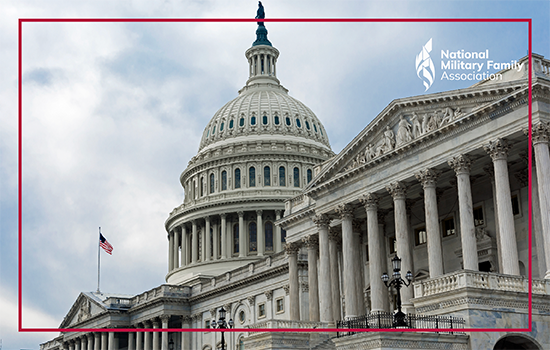What Military Families Need to Know if there is a Government Shutdown

We are just days from a possible government shutdown, and military families are feeling the pressure.
When so many military families are already worried about making ends meet, now we can’t even count on a paycheck.
The Coast Guard remembers what that’s like – when our government shut down for 35 days in 2018-2019, last-minute protections were made to keep our military paid… as long as they were paid by the Department of Defense. The Coast Guard, funded by the Department of Homeland Security, worked all 35 days like normal – without getting paid.
But pay is only half the concern for military families right now. Even if Congress does decide to pay our military (all our military), all the support they have in place to make life manageable – whether it’s their child care, their mental health care, their medical care, even access to safety-net benefits like WIC – is at risk.
“It was death by a thousand cuts that was the hardest,” remembers one Coast Guard spouse. “Members still needed to go to work, so you still had to buy gas. Children still needed school lunches. Mortgages or rents needed to be paid….or deferred. There were the subscriptions that you may have forgotten to cancel that were debited out of your account when you didn’t have the funds, and the overdraft fees that were incurred if that happened. All the small things that are on auto-pilot needed to be addressed. It was just a massive amount of work during the stress.”
While we hope Congress will get its act together and keep the government from shutting down, we have to be prepared. NMFA has been on the Hill and working with DoD to get as much solid information as we can. Here’s what we know:
Pay
Active-duty troops (and Guard and reservists on active-duty orders) are expected to show up for work during a shutdown. In the past, Congress has passed temporary legislation protecting military pay, but some bonuses and other compensation were affected. In 2018, DoD pay was funded but DHS pay was not – so our Coast Guard Families were left unpaid for 35 days.
While Guardsmen and Reservists on active orders should also be protected along with active duty pay, families continue to worry about whether their orders will be canceled or delayed– again, affecting the families’ bottom line.
16,000 military spouses work in the federal government – which means that 16,000 military families used to relying on two incomes are going to drop down to one– and that one isn’t guaranteed.
When at least a quarter of military families experience food insecurity, military families rely on both these incomes to make ends meet.
Safety Net Programs
WIC
The program stops immediately if the government shuts down, affecting millions of Americans and many military families, too. At many military bases, there’s a WIC office on base – and it’s critical to safeguarding the health of our mothers and the youngest, most vulnerable military kids. NMFA fought to expand WIC overseas, where it’s run through medical facilities. It’s unclear at this time whether those programs would still be open.
Supplemental Nutrition Assistance Program (SNAP)
Supplemental Nutrition Assistance Program (SNAP) – formerly known as food stamps – will continue as normal for the month of October, but it could be affected afterward.
Child Care
Military families who rely on a CDC for child care may need to find other child care. Decisions will be made by installations, and some centers will remain open, while others may close.
Health Care
If you get your health care on base, there may be changes. In-patient care, emergency outpatient care, and acute medical and dental care will continue, but there have been no protections made so far for routine medical care. If you get your medical care off-base using TRICARE, your care won’t be affected.
Mental Health Care
While we urge you to check for cancellations if you receive regular counseling support services, some exemptions do provide for continued mental health services. Those include: emergency counseling and crisis intervention intake screening and referral services will continue, as well as counseling and other support for victims of sexual assault and religious, suicide, or substance abuse counseling and services.
PCS and TDY
In the 2018 – 2019 shutdown, families about to PCS and troops planning for temporary travel (TDY) had their travel put on hold. We don’t yet have any information for what would happen this time, but it’s reasonable to assume that any upcoming PCS would be put on hold in a shutdown.
Commissary
Military grocery stores shouldn’t be affected unless the shutdown approaches two months. Overseas commissaries should continue to operate, and any commissaries “determined to be in remote U.S. locations where no other sources of food are reasonably available for military personnel.”
Kids in DoDEA Schools
Classes will still be in session, but extracurriculars will be canceled.
What if you need financial help?
Contact your Service’s aid or relief society.
- Air Force Aid Society: https://afas.org/
- Army Emergency Relief: https://www.armyemergencyrelief.org/
- Coast Guard Mutual Assistance: https://www.cgmahq.org/
- Navy-Marine Corps Relief Society: https://www.nmcrs.org/
Military families, we will keep this list updated as information comes in.
But it’s time to act.
Our families’ financial stability shouldn’t be on the line while the nation continues to ask us to serve. We should be able to count on our paychecks – and our health care, our child care, our mental health care, and our access to the tools and support services that keep our families strong.
Tell your elected officials to do better.




